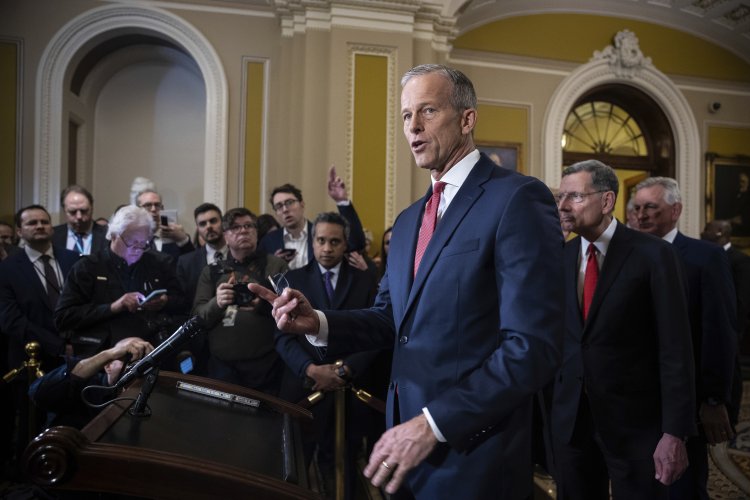GOP senators face another Democratic push to accelerate Trump's major bill
Senate Republicans are aiming to finalize their budget framework early Saturday morning following an overnight debate on amendments, with plans to send the measure back to the House.

For the second time in six weeks, Senate Republicans have initiated the expected “vote-a-rama”—a series of unlimited amendment votes on a budget resolution designed to facilitate the drafting and passage of a proposal that includes border security funding, increased military expenditures, and more. The Senate GOP's updated budget aims to facilitate “one big, beautiful bill,” enabling tax cuts while granting Republicans significant flexibility in deciding how to reduce spending or generate revenue in the final legislation.
Senate Minority Leader Chuck Schumer presented the Democratic approach for the vote-a-rama as one that would challenge “Trump’s agenda,” pushing amendments that would require Republicans to choose whether to eliminate the “kill switch” on Trump's tariffs and disengage Elon Musk’s Department of Government Efficiency.
“Will Republicans spend all night defending the mess Donald Trump is making?” Schumer questioned from the Senate floor.
Facing mounting pressure after being outmaneuvered last month regarding a Republican government funding bill, Democratic senators initiated the evening by compelling their Republican counterparts to cast difficult votes addressing reductions to SNAP nutrition assistance, increasing the national debt, scaling back Medicaid benefits, and eliminating Trump’s tariffs. Additionally, they prepared votes on amendments aimed at preventing tax reductions for individuals earning over $1 billion annually and prohibiting federal workers from unionizing.
Republicans argued that some amendments were irrelevant to the bill, including one aimed at preventing federal officials from transmitting classified information through unsecured commercial applications—highlighting the Trump administration’s practice of using group chats to coordinate military strike plans.
“There are a lot of problems in the world: Male pattern baldness, lactose intolerance, flat feet. There’s a time and place to address those problems, but it’s not tonight and it’s not on this bill,” stated Sen. Tom Cotton during the proceedings.
In the meantime, some Republicans planned to suggest adjustments to the budget framework throughout the night. Sen. Josh Hawley joined forces with Sen. Ron Wyden on an amendment to eliminate an $880 billion spending cut instruction directed at the House Energy and Commerce Committee, which has raised concerns about potential Medicaid benefit reductions. Sen. Rand Paul, who opposed the budget framework, proposed an amendment allowing Republicans to raise the debt ceiling by $500 billion in the final bill, a significant reduction from the sought-after $5 trillion.
“There’s nothing conservative — absolutely nothing conservative — about adding $5 trillion in debt,” Paul asserted, emphasizing that such an increase would represent the largest hike in U.S. history. “If we kick the debt deadline two years down the road, the cuts likely will never happen.”
Paul's amendment was ultimately rejected with a vote of 5-94.
Ahead of sunrise, Senate GOP leaders aim to conclude the barrage of amendments with a vote to endorse their revised budget framework, sending it back to the House. If the House supports the budget as is, despite some fiscal conservatives’ objections, congressional Republicans will have made strides towards facilitating Trump’s legislative agenda without the threat of a filibuster.
The president is counting on the passage of this package to invigorate the U.S. economy as financial markets shake amid his recent series of tariffs. Just before the Senate commenced its amendments, Trump took to social media stating that “big business is not worried” about tariffs but rather focused on a “BIG, BEAUTIFUL DEAL,” which he claims will “SUPERCHARGE our Economy. Very important. Going on right now!!!”
Democrats counter these claims, arguing that the proposed package will lead to further enrichment of billionaires, an increase in the national debt, and cuts to essential safety-net programs.
Sen. Jack Reed put forth an amendment designed to prevent Republicans from reducing health care coverage for Medicaid recipients in their final package. “The question is: Will you protect the nearly 80 million Americans who rely on Medicaid, or will you rely on tax giveaways for the wealthiest at the expense of everyone else?” Reed asked.
The Senate rejected that amendment 48-51, with Republican Sens. Susan Collins and Hawley aligning with Democrats in support. Sen. Mike Crapo, the Senate’s leading tax writer, accused Democrats of employing “the politics of fear” and stated that Trump had been clear: “any reforms to Medicare or Medicaid must not reduce patient benefits.”
Furthermore, Hawley mentioned that Trump had assured him over the phone on Thursday that he would not endorse any final package that diminishes Medicaid benefits. “At the end of the day, I mean, he's in charge. This is his bill,” Hawley said regarding Trump.
An additional amendment aimed at protecting Medicaid and Medicare, proposed by Sen. Dan Sullivan, was approved with a vote of 51-48. Notably, two dozen Democratic senators who had supported a similar amendment in 2017 reversed their stance on Friday, including Oregon Sen. Ron Wyden, the leading Democrat on the Senate Finance Committee.
Wyden argued that the amendment “basically says if somebody thinks you’re not poor enough, you’re not sick enough or you’re not disabled enough, we’re not going to be there for you.”
Democrats portrayed the Republican plan as financially irresponsible, with Sen. Jeff Merkley proposing an amendment that would stop Republicans from enacting a final package that increases the national debt beyond what the U.S. has accumulated since its founding in 1776.
“We’ve never had a more fiscally irresponsible bill on the floor of the Senate than this one,” Merkley, who holds a leading position on the Senate Budget Committee, remarked.
In response, Senate Budget Chair Lindsey Graham asserted that the goals of the Republicans’ massive bill are twofold: to rein in federal spending and to make permanent a series of expiring tax cuts from 2017. “Because every time we cut taxes, revenue goes up, we just spend too much,” Graham contended.
Camille Lefevre for TROIB News
Find more stories on Business, Economy and Finance in TROIB business












